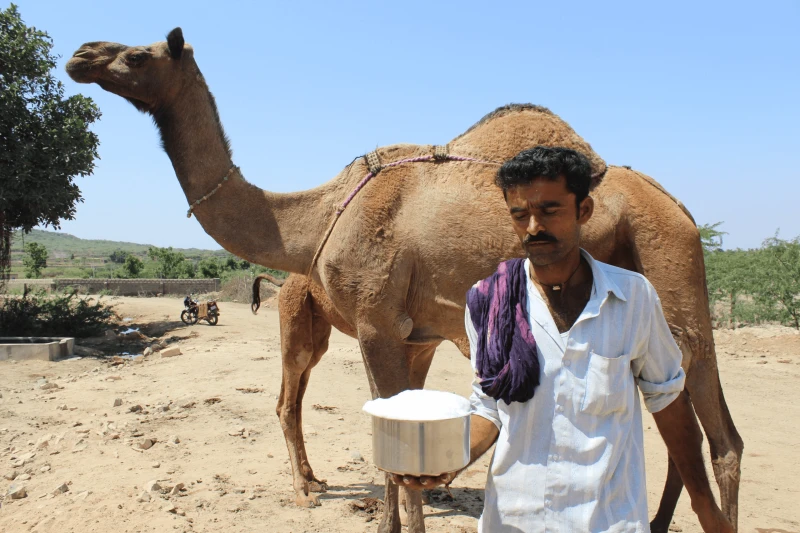Alternative animal milk on the rise: ‘By 2050, it’s possible we’ll have a choice between cow’s milk and camel’s milk in the UK’
Alternative animal milk on the rise: ‘By 2050, it’s possible we’ll have a choice between cow’s milk and camel’s milk in the UK’


If you’re living in Europe or the US, the idea of dousing your cereal in camel milk or cooking up a romantic camel steak for your partner might seem strange, but the humped animal has been a staple of diets in certain communities for thousands of years.
Now, camels are on the rise beyond their traditional homelands and their produce is cropping up on shelves around the globe.
It’s even the UN’s International Year of the Camelids (the family of animals that includes camels, alpacas and llamas), celebrations for which include a grand parade of camels and their cousins through the streets of Paris on 20 April.
According to the UN, camels already contribute about 8 per cent of total milk production in Sub-Saharan Africa. Meanwhile, market research estimates that the global camel milk trade could exceed $13 billion by the end of the decade, up from $1.3 billion in 2022.
Ahearn explains that in countries like Saudi Arabia, the United Arab Emirates, Kazakhstan and Mongolia, camel milk is already commonplace in grocery store refrigerators and that as investors spy a good business opportunity, money is pouring into new farms across the region.
“By 2050, it’s possible we’ll have more choice between cow’s milk and camel’s milk in the UK,” [Dr Ariell Ahearn, departmental lecturer in human geography at the University of Oxford] says.
This is an excerpt. Read the original post here

 | Videos | More... |

Video: Nuclear energy will destroy us? Global warming is an existential threat? Chemicals are massacring bees? Donate to the Green Industrial Complex!
 | Bees & Pollinators | More... |

GLP podcast: Science journalism is a mess. Here’s how to fix it

Mosquito massacre: Can we safely tackle malaria with a CRISPR gene drive?

Are we facing an ‘Insect Apocalypse’ caused by ‘intensive, industrial’ farming and agricultural chemicals? The media say yes; Science says ‘no’
 | Infographics | More... |

Infographic: Global regulatory and health research agencies on whether glyphosate causes cancer
 | GMO FAQs | More... |

Why is there controversy over GMO foods but not GMO drugs?

How are GMOs labeled around the world?

How does genetic engineering differ from conventional breeding?
 | GLP Profiles | More... |

Alex Jones: Right-wing conspiracy theorist stokes fear of GMOs, pesticides to sell ‘health supplements’




 Viewpoint — Fact checking MAHA mythmakers: How wellness influencers and RFK, Jr. undermine American science and health
Viewpoint — Fact checking MAHA mythmakers: How wellness influencers and RFK, Jr. undermine American science and health Viewpoint: Video — Big Solar is gobbling up productive agricultural land and hurting farmers yet providing little energy or sustainabilty gains
Viewpoint: Video — Big Solar is gobbling up productive agricultural land and hurting farmers yet providing little energy or sustainabilty gains Fighting deforestation with CO2: Biotechnology breakthrough creates sustainable palm oil alternative for cosmetics
Fighting deforestation with CO2: Biotechnology breakthrough creates sustainable palm oil alternative for cosmetics Trust issues: What happens when therapists use ChatGPT?
Trust issues: What happens when therapists use ChatGPT? 30-year-old tomato line shows genetic resistance to devastating virus
30-year-old tomato line shows genetic resistance to devastating virus California, Washington, Oregon forge immunization alliance to safeguard vaccine access against federal undermining
California, Washington, Oregon forge immunization alliance to safeguard vaccine access against federal undermining The free-range chicken dilemma: Better for birds, but with substantial costs
The free-range chicken dilemma: Better for birds, but with substantial costs ‘You have to treat the brain first’: Rethinking chronic pain with Sanjay Gupta
‘You have to treat the brain first’: Rethinking chronic pain with Sanjay Gupta
